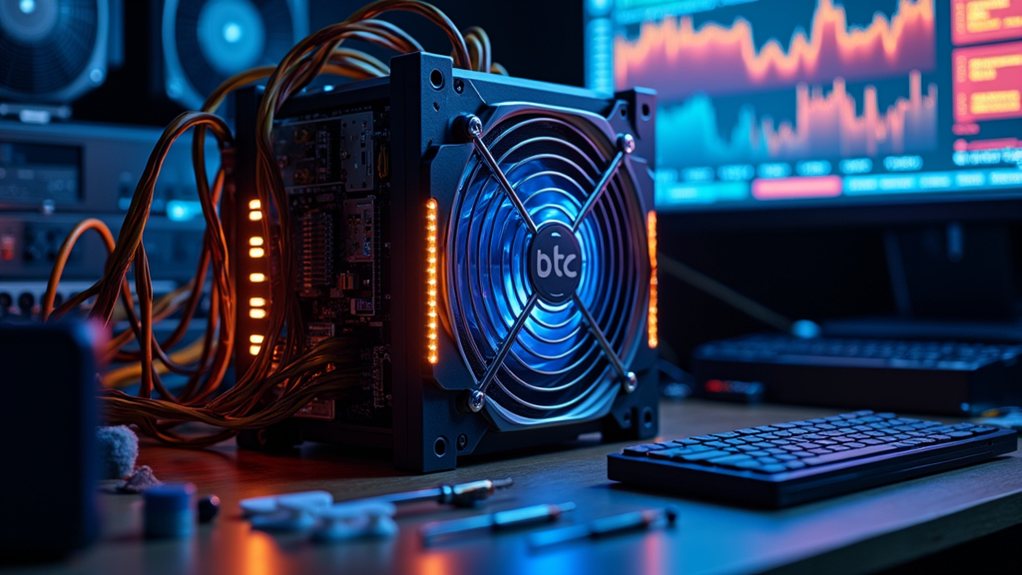Fungible tokens are digital assets that are interchangeable and identical in value—think cryptocurrency, not unique collectibles. They're created through smart contracts on blockchains like Ethereum, usually following the ERC-20 standard. These tokens serve as currencies, governance tools, or utility passes within digital ecosystems. Development requires coding knowledge, typically in Solidity. Regulatory hurdles exist, from securities laws to KYC requirements. The token economy's complexity hides behind these seemingly simple digital coins.

Tokens. They're everywhere in the blockchain world. Digital assets sitting on blockchains, waiting to be transferred, traded, or hoarded. Most people think only of Bitcoin, but the token universe stretches far beyond that original cryptocurrency.
Fungible tokens are the workhorses of crypto—interchangeable, divisible, and uniform in value among their own kind. Like dollar bills. One equals another. Simple.
Creating these tokens isn't rocket science. Someone deploys a smart contract on a blockchain, usually Ethereum. They define basics: name, symbol, total supply. The contract implements standard functions like transfer and balance checking. Most Ethereum-based tokens follow the ERC-20 standard. That's important. Standardization means compatibility. The creator mints the initial supply to their address, and boom—new token exists. Some creators lock liquidity. Smart move for price stability.
The beauty of fungible tokens lies in their simplicity—deploy, define, mint, and you've created digital value from code.
These digital assets serve numerous purposes. Cryptocurrencies like Bitcoin and Ether? Fungible tokens. Stablecoins pegged to real-world currencies? Same thing. Governance tokens let holders vote on platform decisions. Utility tokens provide access to services. Some even represent real-world assets. Companies like Facebook with its Project Libra are seeking to enhance their ecosystems by implementing their own tokens. These tokens are truly owned by users and form the foundation of decentralized financial ecosystems. Utility tokens face less regulatory scrutiny than tokens designed as investment vehicles, since they primarily provide functional access to products or services. Versatile little things.
The technical side requires some coding chops. Ethereum developers typically use Solidity language. Many rely on OpenZeppelin libraries to avoid security disasters. Gas fees apply for deployment and transactions—sometimes painfully high. Public functions allow user interactions, while events track activities off-chain. Not exactly beginner-friendly, but not impossible either.
Token economics make or break projects. Supply mechanisms vary wildly: fixed supply, inflationary, deflationary. Distribution happens through ICOs, airdrops, or mining. Market cap equals supply multiplied by price. Basic math. Liquidity pools enable trading on decentralized exchanges. Some projects burn tokens to reduce supply, creating scarcity. Economics 101 meets crypto.
Regulations cast long shadows over token projects. Securities laws might apply—hello, Howey Test. KYC/AML requirements can dampen the crypto-anarchist dreams. Tax implications exist for creators and holders alike. Rules vary by jurisdiction. Compliance matters, regardless of how much libertarians grumble about it.
Risks abound in token land. Smart contracts contain vulnerabilities. Markets swing violently without warning. Blockchain networks struggle with scaling. Regulations shift like sand dunes. Users lose fortunes through basic security mistakes. It's financial Wild West out there.
Despite these challenges, fungible tokens continue reshaping digital ownership and value exchange. They're not perfect. They're not always useful. But they're redefining what money can be in the digital age. That's something.
Frequently Asked Questions
How Do Taxes Work for Fungible Token Investments?
Fungible tokens get treated as property by the IRS.
Sell or swap them? That's a taxable event.
Pay for coffee with your tokens? Taxable.
Get some as payment? Income tax applies.
Holding period matters—keep them over a year for better rates.
Every transaction needs reporting on tax forms.
The government wants its cut, no exceptions.
Some folks try tax-loss harvesting when prices tank.
Crypto tax rules keep evolving.
Can Fungible Tokens Be Converted to Physical Assets?
Yes, fungible tokens can absolutely be converted to physical assets. It's happening already.
Gold-backed tokens let investors redeem digital holdings for actual gold bullion. Stablecoins backed by real currency reserves work similarly. Smart contracts automate the process, while custodians manage the physical stuff. Pretty convenient, right?
But there are complications. Regulatory hoops to jump through. Custody issues. Potential delays in redemption. Nothing's ever simple in crypto-land.
What Security Measures Protect My Fungible Tokens?
Fungible tokens rely on layers of protection. Hardware wallets top the list—they're virtually unhackable.
Two-factor authentication works wonders. Smart contract audits separate legitimate projects from scams. Reputable exchanges offer insurance. Private keys stay offline, obviously.
Password hygiene matters. Most people get hacked through social engineering, not technological breaches. Regular security updates are non-negotiable.
Bottom line: security is a practice, not a one-time setup.
How Do Fungible Tokens Impact Traditional Banking Systems?
Fungible tokens are reshaping banking fundamentals. They slash transaction costs by eliminating middlemen and enable instant settlements—no more waiting days for transfers.
Banks are losing fee revenue, obviously. New competitors are emerging everywhere. Financial products that were once exclusive club memberships are now accessible to regular folks.
The 24/7 nature of token markets means banking's 9-to-5 model looks downright prehistoric. Adapt or die, basically.
Are Certain Fungible Tokens More Environmentally Friendly Than Others?
Yes, massive differences exist.
Proof-of-Stake tokens crush Proof-of-Work ones environmentally. Bitcoin? Energy hog at 707 kWh per transaction. Algorand? Carbon-negative at just 0.000008 kWh. That's, like, 88 million times less.
Ethereum finally got its act together with a 99.988% energy reduction after ditching PoW.
Solana, Tezos, and Nano are all pretty green too.
The tech matters, folks. Environmental impact isn't created equal.








